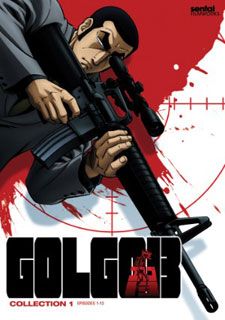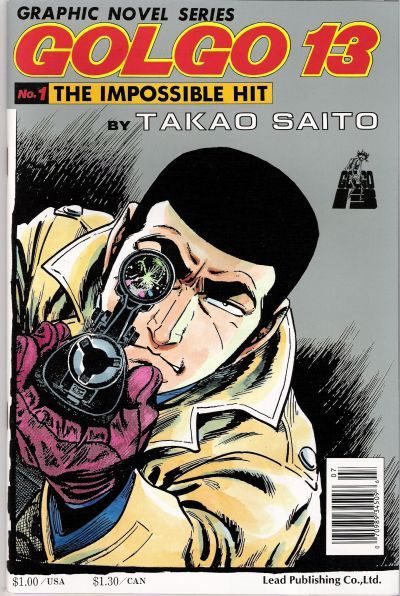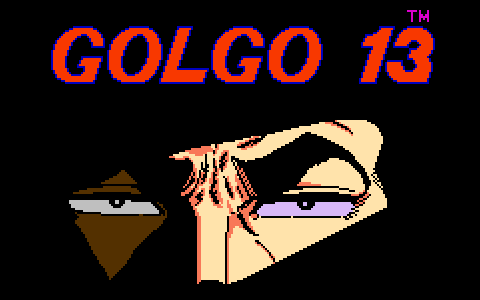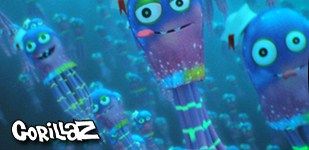Away from the Shop #3: Jeff Talks Inception, Golgo 13, and (Mostly) Non-Comics
/Here's another post from me about stuff I have not picked up at the comic book shop recently: a movie, an album, a dvd, and a TV series. (Man, there's got to be a way I can wrangle a video game review in here, too.) Since I recently spent over two thousand words writing about two comic books, I tried to make this quick, but...well, blabbity-blab happens, you know? (Blabbity-blab behind the cut.)
INCEPTION: I'm from the icy formalist school myself, so it's not surprising I dug this. (Though I'm both surprised and pleased so many other audience members at my screening did as well.) Rather than bore you with any of my theories about the flick--I have a lot of 'em but I think they're well-covered pretty much everywhere else on the Net--I'll just mention how it's kind of a drag it took eleven years for someone to make a movie that feels like a legitimate response to The Matrix. While everyone and their smaller-budgeted brother ripped off the bullet time, the tag lines, the soundtrack, and the fight scenes, this and Aaronofsky's The Fountain are the only movies I can think of that feel like they're engaging in a discussion with the Wachowski Brothers flick, or using that movie's underlying thematic concerns as a departure point for their own.
By contrast, I feel like I can sit down and watch Solaris, Silent Running, The Man Who Fell To Earth, Dark Star, good ol' apeshit Zardoz, Alien, and even Star Trek: The Motion Picture, and see where the filmmakers are using the ideas of 2001 as a touching-off point for their own speculations about human nature and how it will fit into the larger pattern of the cosmos. And all of these films came out in the same span of time--eleven years--as that between The Matrix and Inception.
Maybe I'm leaving out tons of examples and god knows, it's not like The Matrix didn't leak, like a canister of toxic waste buried in somebody's backyard, into every corner of pop culture. But clearly, Nolan took up the challenge of an action-movie-that-continually-points-outside-its-own-frame and I don't think it's just because he was the only one who wanted to do so--it was because he'd just made Warner Brothers a stupendous shitload of money and he had a highly bankable star that wanted to be in it...and the number of people in that particular position are very, very small. Hollywood is now the kind of place where dozens of iterations can be squeezed out but none of those iterations can really comment on one another and I don't know why. Is it because they're not so much variations on a theme as they are a bunch of people trying to rip off the same tune, and I guess commenting on a theme would be tacky?
Or maybe I'm old and really unable to think of good examples. I dunno. Anyway, I quite liked the flick: seeing it and reading Scott Pilgrim v6 within 48 hours of each other gave me a very optimistic feeling about the state of nerd culture 2010 overall.
GOLGO 13 v1 DVD: You might remember me going on and on about each of Viz's "best of" collection that gave us a handful of adventures of Taiko Saito's tight-lipped assassin. So it's not surprising that once I found out about this thirteen episode collection of a 2008 series by animation company Tokyo TV, I was all over it.
What is surprising is that I found out about it at all: if I hadn't added the RSS feed for Japanator on an impulse two weeks before the press release, I never would've known. And once I did find out, that didn't help me much: the distributor Section23 films has had this as their incredibly unhelpful website for some time now. (Sometimes I think we should classify entertainment media the way we classify stars--anime is teetering right on the edge of brown dwarf status in this country, capable of keeping objects in its orbit but not emitting anything like visible light.) Instead of just forgetting about the DVD set after getting nothing but the same press releases over and over, I eventually realized I could pre-order a copy from Amazon.
So. This DVD set. It's two bare-bone discs, the animation is cheap-bordering-on-shoddy, and the voice cast is decent but overworked. (Here's a tip for voiceover directors: if in the course of thirteen episodes, you let a voice actor do his Jimmy Stewart imitation for two entirely different characters? They are being overworked.) It's a little pricey, considering what you get.
And yet, that said, you'd have to hire an emotionless Japanese sniper to shoot this collection out of my hands. Each episode is brief, between 22 to 25 minutes tops, but from what I can tell the stories are compact, faithful adaptations of classic Golgo 13 manga stories. In fact, the very second episode in the set, Room No. 909, is an adaptation of "The Impossible Hit," the very first Golgo 13 story I ever read, hot on the heels of playing the awesome Nintendo game.
(And Jesus, if either of those two links ring a bell and you haven't read it already, check out Jog's amazing two part look at the character and his infiltration of America that the big J wrote back Two Thousand and fucking Five. As always, Jog is on the money, to the point where his idle speculations as to what stories might be adapted for this series are, if the coming attractions at the end of this set are anything to go by, very likely dead-on.)
Golgo 13 stories can go several different ways, and the time limitations on each episode here keep them away from the densely researched, ultra-wonk political stories (that ended up in the print collection) and keep them focused on more basic "who's Golgo got to kill now/how's he gonna do it" with a special emphasis on the "...and how is he gonna get away with it?" episodes. I'm a big fan of the latter, probably because "The Impossible Hit" is just such a story--a savvy investigator realizes G-13 is the assassin he's after but he has only has so much time to prove it. Three of the thirteen episodes on this disc are variations of this story and I found each one utterly satisfying. Golgo 13 is less like James Bond (although that's clearly a huge piece of his inspiration) and more like Batman--he's always prepared and he always wins--and the satisfaction of the story comes from seeing how, exactly, he's going to win even as the odds pile up against him.
Unlike Batman, you never, ever get inside Golgo-13's head, even when you follow the character in a story from beginning to end. He gives up nothing, has no affiliations other than professional. Since the Golgo 13 series was created for, and avidly read by, Japanese salarymen, it's not hard to see G-13 as a specific idealized fantasy of the Japanese businessman--in this set, the template for each episode usually has the character fly somewhere (jumbo jets are to Golgo-13 what rain-slickened gargoyles are to Batman), get offered millions of dollars and begged for his services, dispatch his job with calm detachment, and then fly away after sticking it to the dudes at customs. (Because the episodes run a little tight, there's not always time to have him meet a woman and immediately bed her, but the producers are sensible enough to put that scenario in both the opening and ending credit scenarios.) When put like that, it's pretty easy to see why Golgo 13 is so appealing to his target demographic. It's also pretty hard to see why any of the rest of us wouldn't find his stories unbelievably dull.
But they're not dull, for two reasons: first, the amount of research and funky technical twists give each story little surprises for the reader outside of the fomula. Second--and maybe this is really why Golgo 13 works for me, as opposed to Jog or Tim Leong or somebody--Golgo 13 is so devoid of personality, it's easier to see him as a force of nature or, more precisely, as the personification of death. G-13 is like Anton Chigurh from No Country for Old Men--a hit man, a foreigner, a bit odd, and a few steps ahead of everyone. If a half-hour TV show where you'd watch Anton Chigurh bump off somebody new each week sounds pleasingly perverse to you, then you get a fraction of the appeal this set holds for me.
Golgo also reminds me a bit of Michael Myers from John Carpenter's Halloween, which was refreshingly free of the teen morality of slasher films that followed in its wake. In Halloween, Michael Myers becomes obsessed with Laurie Strode just because he sees her at his old house. All that shit that goes on to happen to her happens only because she was in the wrong place at the wrong time. (That's also the reason for everything that happens in Assault on Precinct 13, which I also love.) A few episodes on this disc pick another standard direction for a G-13 story--the person who hires Golgo 13 for a hit but tries to cheat him in some way--but that's as close as the stories get to a traditional "poetic justice" angle. Really, the "point" of a G-13 story, again and again, is that Golgo 13 always kills somebody, whether they deserve it or not, and then gets away with it. Part of the stories' dramatic tension come from their continual bucking of the traditional "and in the end, the good guys win or at least justice is served" arc common in most of our pop culture.
In this way, good ol' Golgo 13 embodies the Nietzschean conception of the übermensch in a lot of different ways--he really is beyond good and evil--and so is a certain kind of boogie man for middle-aged guys like me (and maybe those Japanese salarymen) who've spent the majority of our lives coloring within the lines. Just as horny teens find some relief in having a masked figurant uphold and avenge their childish puritanism and sexual squeamishness by jamming a pitchfork through a couple rutting in a tool shed, so too does Golgo 13 offer guys like me a world outside morality without the accompanying terror of total nihilism
Anyway, if that's the kind of thing you like to think about while people get neat little bullet holes right in the center of their forehead, this is the anime set for you. The Anime Network has the first episode up for non-subscribers to watch (probably U.S. only), although I should warn you it's not my favorite. (In fact, it's probably my least favorite, after the one with the mafia mistress.) But it'll give you a little bit of the flavor. Believe me though, the one where Golgo 13 has to commit the hit in a crowded stadium filled with police and somehow get away, or the one where a counter-sniper is hired to prevent his hit, or the violin string episode, are much, much better. GOOD stuff.
WEEDS, SEASONS 1-4: Edi and I had the first two seasons lent to us and figured, ehh, why not? (I've already resigned myself to going to my grave before she gives the thumb's-up on Deadwood.) This show drives me crazy because it is madly uneven--I don't think ever watched a show that could deliver so many interesting little bits of character and nuance and then just flush it all away with a flat bit of stupid shtick--and kinda crazily ambitious: there are eight core characters, jammed into episodes that run under half an hour. (The first season, in fact, has episodes that average 22 minutes, which is just insane with a cast like that.)
What I thought was cool about the first half of the first season is how its set-up mirrors the superhero template perfectly: newly widowed mom Nancy Botwin (Mary-Louise Parker) turns to dealing pot as a way to keep her and her kids in the expensive sheltered community of Agrestic, and her attempts to balance her secret identity as a pot dealer and her life as a full-time mom/member of the community is very much in the Peter Parker/Clark Kent vein. Fortunately, we don't get an origin story for *how* Nancy gets into pot dealing, so the show starts at a spry clip. And underneath all the light quick-moving scenes is a really terrific performance from Parker, who manages to make the contradictions of the character work--the first season is at its best when it seems to be a portrait of someone processing grief in very odd ways, someone more likely to laugh in shock rather than cry and possibly driven by guilt to manufacture her own self-destruction.
Spider-Man as a middle-aged drug dealing mom? I'd watch the shit out of that. Unfortunately, the show not only burns through the secret identity thing pretty quickly--I think nearly everyone knows what she's up to two-thirds of the way through the first season--it also ditches any of the ideas it sets up about the suffocating existence of life in a suburban community where everyone needs to have a private life, whether they want one or not. The rest of the season spends as much if not more time with Elizabeth Perkins' character and her plight (she's a controlling ultra-bitch who gets cancer) that feels like Jenji Kohan, the show's creator, never expected to get her pilot approved and had to recycle material from her old ultra-bitch-mom-gets-cancer screenplay.
Additionally, as the seasons go on, the creators decide toy with darker and darker comedy with shakier and shakier results--rather than using Weeds as a light empowerment fantasy, the show insists on having Nancy come up against harsher and harsher realities of the drug trade which would be fine if: (a) those realities didn't always end up turning into goofy fantasies themselves; and (b) if Nancy had more to bring to the game than her beauty and sexuality. I'm a little disturbed and bummed that a show created by a woman with a female protagonist has that protagonist get out of most of her problems by turning most of her enemies into gooey, protective doofuses if she just gets the chance to blink her big doe eyes at them for long enough. (And I won't spoil the fourth season finale for you, but let's just say it takes that concept one unfortunate step further.) It reminds me of the problem I'm having with the Buffy Season Eight Twilight story (the last time I checked in on it) where the fate of humanity appears to hinge on who Buffy chooses as a mate. We have more genuine opportunities for female heroes and protagonists than ever before, but for some reason their ultimate destinies keep leading right back to their ovaries. It bums me out.
PLASTIC BEACH: I only downloaded this recently so admittedly I'm at the height of my love affair with this album--not only is it a concept album, it's a concept album that's a sequel to another concept album, the Gorillaz' previous release, Demon Days. Maybe there's someone else who's done that and succeeded (I'm sure someone will try to tell me either The Kinks or The Who in which case I should just say now: No.) but it's news to me.
The thing I appreciate is Demon Days, also a fave of mine, did a pretty good job in its fabular, conceptual way, of pointing out what an amazingly good job our culture has done of flushing the world down the toilet. Plastic Beach actually has the courage to not let that be the last word on the subject, and return to a trash-filled, culture-strangled world and see what's left--unsurprisingly, the first third of the album is mostly hip-hop and frontman/producer Damon Albarn crooning about how his love's eyes are like "factories far away." The plastic beach is both literal--all the trash and detritus threatening to choke the world--and figurative, pop culture itself, of which Albarn & Co. are aware of themselves as producers and consumers ("Superfast Jellyfish" is this stellar song about the crap passed off as instant food but also about the crap of instant culture.)
But the most amazing thing about Plastic Beach--well, right after "Some Kind of Nature," that somehow works as both a terrific Lou Reed song and a terrific Gorillaz song--is that Albarn doesn't leave things bleak. The album ends on a note that has faith in nature to evolve and process all the plastic, to find a new way to live and grow. Unlike Demon Days, where I'd finish each listen of the album nodding my head to the music and depressed as hell, Plastic Beach gives me something like hope, and not in the pre-packaged easy-to-unwrap way. It feels like something that's been earned, by both the people making the music and the people listening to it, and that's an achievement that feels way too rare these days.
















